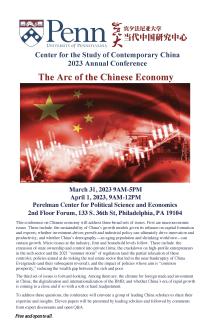Event
 The Arc of Chinese Economy
The Arc of Chinese Economy
CSCC 9th Annual Conference

Support of this conference by the China Research and Engagement Fund of the University of Pennsylvania is gratefully acknowledged.
Conference Papers Download Link (for authors and discussants only; password protected)
China’s economy has been viewed as wildly successful with nearly uninterrupted double-digit GDP growth from the 1970s until the Global Financial Crisis with more modest growth since. Today, the World Bank classifies China as an upper-middle income country that may soon move into the ranks of high-income countries. Yet, there are strong headwinds. COVID-19 lockdowns and the abrupt reversal of the zero-COVID policy have triggered a contraction in manufacturing. Household consumption remains stubbornly low in proportion to GDP. Longer term trends and factors including an aging population, flat or declining productivity, a marked slowdown in real estate and greater government and Party presence in the private sector may bode poorly for China’s long-term growth. A key question is whether the arc of China’s economy has approached an inflection point and the heady optimism of William Overholt’s 1993 The Rise of China has given way to the more somber assessment of a Lowy Institute report released in March 2022 under the title “Revising Down the Rise of China.”
This conference will address three broad sets of issues. First are macroeconomic issues. These include: the sustainability of China’s growth models given its reliance on capital formation and exports; whether investment-driven growth and industrial policy can ultimately drive innovation and productivity; and whether China’s demography—an aging population and shrinking workforce—can sustain growth.
Micro issues at the industry, firm and household levels follow. These include: the extension of state ownership and control into private firms; the crackdown on high-profile entrepreneurs in the tech sector and the 2021 “summer storm” of regulation (and the partial relaxation of these controls); policies aimed at de-risking the real estate sector that led to the near-bankruptcy of China Evergrande (and their subsequent reversal); and the impact of policies whose aim is “common prosperity,” reducing the wealth gap between the rich and poor.
The third set of issues is forward-looking. Among them are: the climate for foreign trade and investment in China; the digitalization and internationalization of the RMB; and whether China’s era of rapid growth is coming to a close and if so with a soft or hard readjustment.
To address these questions, the conference will convene a group of leading China scholars to share their expertise and insights. Eleven papers will be presented by leading scholars and followed by comments from expert discussants and open Q&A. The conference is free and open to all.
Conference Agenda
03/31/2023
8:45AM Opening Remarks
9:00-10:30AM
China’s GDP Growth
Justin Lin, Peking University (via video)
Lant Pritchett, Oxford University (via video)
Tom Rawski, University of Pittsburgh (via video)
Michael Song, Chinese University of Hong Kong (via video)
Chenggang Xu, Stanford University (via Zoom)
Discussants: Daniel Rosen, Rhodium Group
Marshall Meyer, University of Pennsylvania
10:30-11:15AM
The Political Economy of Common Prosperity
Yasheng Huang, MIT (via Zoom)
Discussants: Shi Li, Zhejiang University (via Zoom)
Yue Hou, University of Pennsylvania (via Zoom)
11:15- 11:30AM Coffee Break
11:30-12:15PM
Derisking Real Estate in China’s Hybrid Economy
Wei Xiong, Princeton University
Discussants: Susan Wachter, University of Pennsylvania
Joe Gyourko, University of Pennsylvania
1:45-2:30PM
Innovation in China: Drivers, Challenges, and Future Directions
Kevin Zheng Zhou, University of Hong Kong
Discussants: Nan Jia, University of Southern California
Minyuan Zhao, Washington University in St. Louis
2:30-3:15PM
China's Productivity Challenge
Xiaodong Zhu, University of Hong Kong
Discussants: Hongxin Zhao, Saint Louis University
Nan Jia, University of Southern California
3:15-3:30PM Coffee Break
3:30-4:15PM
The “Summer of 2021” and the Trajectory of the Chinese Economic System
Barry Naughton, UC San Diego
Discussants: Margaret Pearson, University of Maryland
Minyuan Zhao, Washington University in St. Louis
4:15-5:00PM
When the Abundance Ends: Economic Transformation, Population Aging, and Shrinking Lifecycle Surplus in China, 2000-2020
Feng Wang, UC Irvine; Shen Ke, Fudan University
Discussants: Cai Yong, University of North Carolina
Emily Hanuum, University of Pennsylvania
5:00-5:30PM Publication Planning (paper authors and discussants only)
04/01/2023
8:45-9:30AM
Centralization or Decentralization? The Evolution of State-Ownership in China
Linda Zhao, University of Pennsylvania; Jeff Cai, University of Notre Dame
Discussants: Margaret Pearson, University of Maryland
Hongxin Zhao, Saint Louis University
9:30-10:15AM
China’s Journey in Embracing Economic Openness: Four Perspectives
Shang-Jin Wei, Columbia University
Discussants: David Dollar, Brookings Institution
Jacques deLisle, University of Pennsylvania
10:15-10:30AM Coffee Break
10:30-11:15AM
RMB Internationalization and Digitization
Vivian Zhanwei Yue, Emory University
Discussants: Hanming Fang, University of Pennsylvania
Hui Tong, IMF (via Zoom)
11:15-12:00PM
China’s Long-term Economic Prospects
William Overholt, Harvard University
Panel Discussion: Daniel Rosen, Rhodium Group
David Dollar, Brookings Institution
Hanming Fang, University of Pennsylvania
